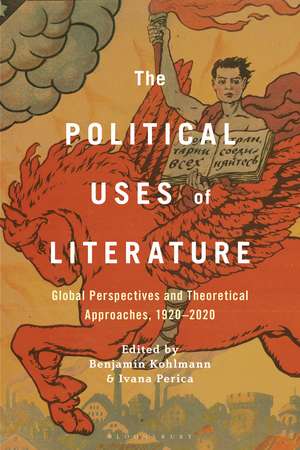The Political Uses of Literature: Global Perspectives and Theoretical Approaches, 1920-2020
Editat de Prof. or Dr. Benjamin Kohlmann, Dr. Ivana Pericaen Limba Engleză Hardback – 10 ian 2024
Preț: 541.13 lei
Preț vechi: 774.45 lei
-30% Nou
Puncte Express: 812
Preț estimativ în valută:
103.56€ • 106.98$ • 86.19£
103.56€ • 106.98$ • 86.19£
Carte tipărită la comandă
Livrare economică 25 martie-08 aprilie
Preluare comenzi: 021 569.72.76
Specificații
ISBN-13: 9781501399336
ISBN-10: 1501399330
Pagini: 312
Ilustrații: 3 bw illus
Dimensiuni: 152 x 229 x 23 mm
Greutate: 0.59 kg
Editura: Bloomsbury Publishing
Colecția Bloomsbury Academic
Locul publicării:New York, United States
ISBN-10: 1501399330
Pagini: 312
Ilustrații: 3 bw illus
Dimensiuni: 152 x 229 x 23 mm
Greutate: 0.59 kg
Editura: Bloomsbury Publishing
Colecția Bloomsbury Academic
Locul publicării:New York, United States
Caracteristici
Proposes a literary-historical genealogy to debates about literature's political uses, with key historical moments in the interwar years, in the 1960s and in contemporary times
Notă biografică
Benjamin Kohlmann is Professor of English at Regensburg University, Germany, and author of Committed Styles: Modernism Politics and Left-Wing Literature (2014) and British Literature and the Life of Institutions: Speculative States (2021). His co-edited volumes include A History of 1930s British Literature (2019; TLS Books of the Year). Ivana Perica is Marie Jahoda Scholar at the University of Vienna, Austria, and author of Die privat-öffentliche Achse des Politischen: Das Unvernehmen zwischen Hannah Arendt und Jacques Rancière (2016).
Cuprins
List of IllustrationsIntroductionIvana Perica (University of Vienna, Austria) and Benjamin Kohlmann (University of Regensburg, Germany)Part I: Revolution, Internationalism and Literary Politics: Interwar Paradigms 1. Marxists Out of Work: Literature and the Useless in Interwar IndiaBenjamin Conisbee Baer (Princeton University, USA)2. Politics and Literature on the Peruvian Periphery: Realism and Experimentation in the Works of César Vallejo and José Carlos MariáteguiJuan E. De Castro (The New School, USA)3. Reusing Artaud? On the Contemporaneity of Messages révolutionnaires (1936)Sandra Fluhrer (Freie Universität Berlin, Germany, and University of California-Berkeley, USA)4. On the German Popular Front and the Novel in Historical and International ContextHunter Bivens (University of California-Santa Cruz, USA)5. Narrative Struggle: "Good" and "Bad" Uses of Literature in the Committed Novel of the 1930s (Aragon, Dos Passos)Aurore Peyroles (University of Regensburg, Germany)6. Moscow, 1934 - Yan'an, 1942: The Manifesto as Lived ExperienceSteven Lee (University of California-Berkeley, USA) Part II: Politicizing Theory and Literary Practice in the Global 1960s: Inflection Points7. Militant Structures of Feeling: Raymond Williams, Claude Lefort, and Workers' InquiryDaniel Hartley (Durham University, UK)8. Solidarity in Black and WhiteJ. Daniel Elam (University of Hong Kong)9. Notes from the Underground, or: Why and How Was Non-Marxist Theory Resisted by Non-Marxists in a Totalitarian SocietyGalin Tihanov (Queen Mary University of London, UK)10. Workshops of Abolition: Attica Print Culture and Small Press PoetryMark Nowak (Manhattanville College, USA)11. An Autofictional Intervention into Working-Class Literature: Karin Struck's Klassenliebe and the Werkkreis Literatur der ArbeitsweltChristoph Schaub (University of Vechta, Germany)12. Feminism and Progressive Writing in Twentieth-Century IndiaUlka Anjaria (Brandeis University, USA)Section III: The Political Uses of Literature Today: Legacies and Departures13. Cultural Politics after the Arab Spring: A New Lotus for a New World?Maryam Fatima (University of Massachusetts-Amherst, USA)14. Segments of a Larger Narrative: Political Formalism and Working-Class Story CyclesDirk Wiemann (University of Potsdam)15. Sedimented Reading Habits? The Future Utopia in Contemporary African Science and Speculative FictionPeter Maurits (University of Erlangen-Nuremberg, Germany)16. Literary Activism in Contemporary Africa: Praxis, Publics and the Shifting Landscapes of the 'Literary'Madhu Krishnan (University of Bristol, UK)Notes of ContributorsIndex
Recenzii
An absorbing, richly textured, and innovative study that engages a welcome range of voices and geographical sites. The Political Uses of Literature opens new perspectives on literature and activism of the past 100 years, sensitively illuminating the local specificities and shifting historical conjunctures shaping the purposes to which politicized art has been put in transnational movements and theoretical conversations.
This is a timely and necessary book that presents a compelling case for re-establishing political purpose as central to artistic production. The breadth of its focus marks it out as a landmark contribution to the comparative analysis of international political writing.
Kohlmann and Perica's edition offers a most welcome resource, in one volume, shoring up the contemporary in relation to prior understandings of the 'political uses' of literature. Portable, and providing expert (suitably targeted) coverage, The Political Uses of Literature leads its emerging field by virtue of effective consolidation.
This is a timely and necessary book that presents a compelling case for re-establishing political purpose as central to artistic production. The breadth of its focus marks it out as a landmark contribution to the comparative analysis of international political writing.
Kohlmann and Perica's edition offers a most welcome resource, in one volume, shoring up the contemporary in relation to prior understandings of the 'political uses' of literature. Portable, and providing expert (suitably targeted) coverage, The Political Uses of Literature leads its emerging field by virtue of effective consolidation.
